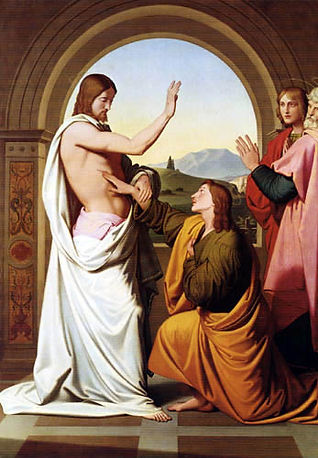
DOMINICA IN ALBIS
23 APRIL 2017
THE OCTAVE DAY OF EASTER
The Second Sunday of Easter

CONSUMMATUM EST
IT IS ACCOMPLISHED, our ‘Easter Duty’, and the first exuberant blossoming of Easter joy. Long forgotten now, the ashes of penitence, and buried, the deficiencies of our Lenten undertakings as the Alleluia is unearthed seventy days (or forty in the new calendar) after its repose. The Cross is behind us; we are the Easter people. A comforting thought, but not one that is borne out by the truth of the resurrection narrated in Holy Scripture, nor by the lives of countless Christians over nearly two millennia. For sure, the resurrection changes everything, and as Christians we live oriented always to the hope that its light gives, but Easter is by no means the end of our own Way of the Cross – it is just the beginning.
We join the apostles today not mid-jamboree but locked in a hideout for fear of the Jews. For them, the news of the resurrection brought to them by Mary Magdalene would have caused them to revisit in their minds every step of their journey with their Master from the day they were called as disciples to the night he was forcibly taken from them to meet his death. They were no longer accomplices of a crucified criminal but the chosen companions of the Son of God. And with their Lord now risen from the dead, they knew that the journey they had begun with him was not ended but only just beginning. The day before, they hid from the Jews because they did not want to die. This evening, they could not afford to die because the resurrection gave their lives new meaning; a meaning they would soon come to understand.
So it was that Jesus came to them, not in a dream, not as an apparition, but in the flesh – no mere symbol that his body is the source of eternal life but the living, breathing reality that even the cruellest death cannot conquer the life that only God gives. And as where, to this day, he shows his glorious body to his disciples, he gives his benediction: “Peace be with you.” And there was peace within them; the peace of God that surpasses all understanding, that is greater than all their thoughts and fears. And they would never be anxious again, for the Lord set his guard over their hearts and minds and answered their innermost questions with a singular hope that would see them embrace the commission, “As the Father sent me, so I am sending you.”
It is now unambiguous, what the Christ came to achieve, and what his followers must in their turn accomplish in his name. He showed them his wounds so that they would always remember that suffering precedes glory, and that the light of the resurrection casts a shadow from the Cross through which all must walk to follow Christ to his Father. But such suffering is not without meaning, as Christ continues, “If you forgive the sins of any, they are forgiven; if you retain the sins of any, they are retained.” The Cross affects the very nature of the Church founded by the breath of the Spirit – the remission of sins. It was for this that Christ suffered and died, and by its share in this suffering that the Church would be known, and make known the eternal life possible only through the sacrifice of the Cross.
How did the apostles understand this call to be sent just as the Father had sent his Son, Jesus Christ? Are we to believe that they thought their mission to follow in the footsteps of Christ without the crucifixion? Did they see a triumphal entry to Jerusalem for themselves, which did not end with their own Good Friday? Most certainly not. And neither should we, who are gathered in our own rooms today waiting to encounter the Risen Lord. Paschaltide was never a time to rest on our laurels, for we have no laurels except the crown of thorns which belongs to Christ. Least of all is Paschaltide a cause for satisfaction that we have accomplished all that we are called to do as Christians. For us, as for the apostles, today’s encounter with Christ is just the beginning. If anything, we must galvanise our faith and be clothed not only in the glory of Christ but in his sacred wounds. Let us rejoice, then, in the Lord, who is risen from the dead, because in him is our hope in every trial and our victory in the hour of our death. In him is the forgiveness of sins through our participation in his Cross, which we achieve through the humble reception of the Sacraments and our submission to the will of God, to be sent into the world just as the Son was sent, to be light and life amidst darkness and death, and to offer ourselves even unto death for the salvation of souls.